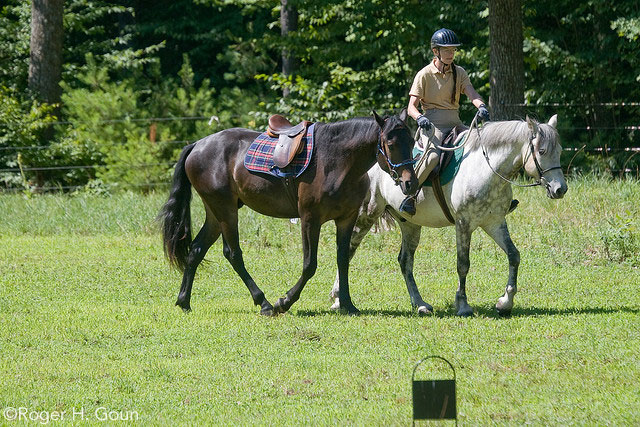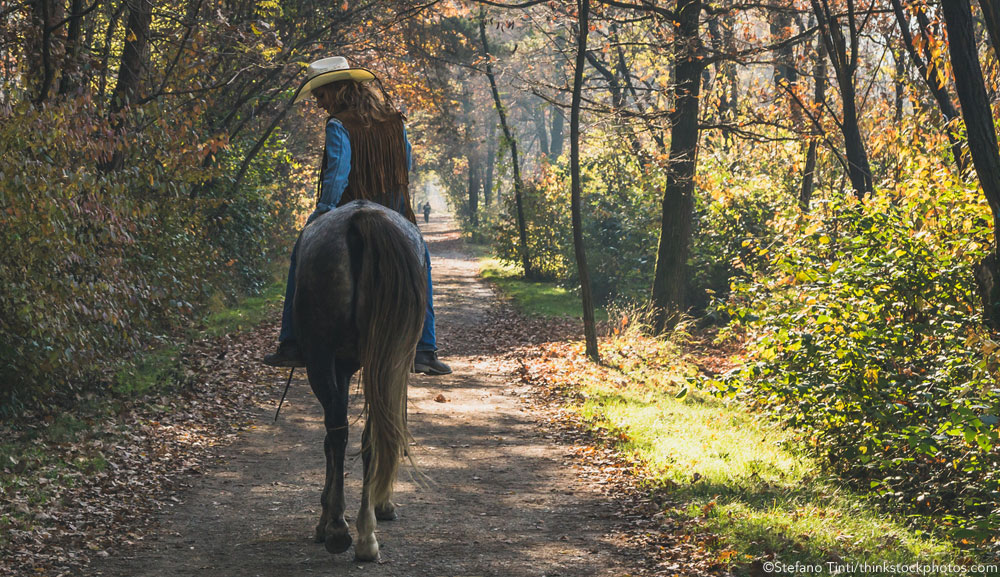We know there are many adults juggling life and horses so that they can pursue their passion for horses. It’s hard but worth it to many, especially these riders.
None of the owners who keep their horses at the Gemini Performance Horse boarding barn are wealthy. Most earn average incomes working at full-time jobs to meet the monthly costs of their own housing, utilities and other routine household expenses. They also work hard to have enough disposable income left over to finance their horse-related expenses.
In an industry traditionally associated with the wealthy, horsekeeping has become dominated by average owners who want their horses to be well-fed, well-trained and responsibly looked after. And they are willing to make the sacrifices necessary to afford it.
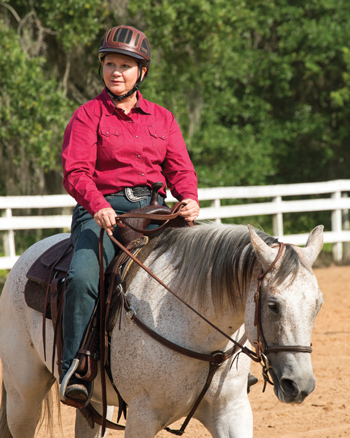
Debbie Conklin works full-time to finance her equestrian pursuits, including showing her Quarter horse mare. Courtesy Debbie Conklin
Among them is Debbie Conklin, who works full-time at a bank to finance her horse-related expenses. According to Conklin, it’s her job that allows her to own, ride and take part in shows with her Quarter Horse, Photons SmartNSassy,
Known around the barn as Ellie. It also means that she has to manage both her time—and her money—well.
“Being with horses has been my heart and soul for 50 years,” Conklin says. “And when you are [a working horse owner], you have to make decisions about how you
spend not only your money, but your time as well.”
So Conklin keeps her horse at a boarding barn and schedules weekly sessions with a trainer. The choice to board her horse is not inexpensive, but it makes sense to her.
“If you do self-care, you don’t have time to ride—you feed, groom and go,” says Conklin. “This way, I’m here Tuesdays, Thursdays and weekends, and I can work with a trainer.”
Juggling Life and Horses for More Than a Hobby
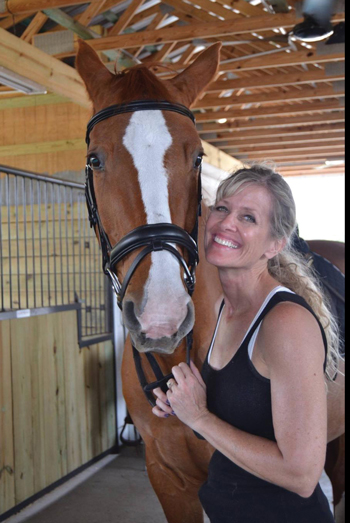
Deborah Simone moved Lovey to be closer to her job so she could see her a few times during the week, in addition to weekends. Courtesy Deborah Simone
For some horse owners who are juggling life and horses, boarding their horses close to their workplace is crucial. Cutting down commute time means extra time to ride and spend with their horse. That’s why Deborah Simone based her horsekeeping decisions exclusively on the location of her job.
Simone, who is a sonographer, was boarding her 18-year-old Hanoverian cross mare, Lovey, at a barn close to her home. But when a new assignment sent her to work in a direction opposite the barn, Simone decided to change Lovey’s location, too.
“Riding her just on weekends just wasn’t enough,” says Simone. Lovey’s new location now allows Simone to visit her boarding barn on Tuesdays, Thursdays and weekends.
“I groom her, take a short 15- or 20-minute ride around the property, and just spend time with her,” says Simone. “If you love something—if it’s your passion—you’ll find a way.”
For after-work equestrians, finding a way means determining exactly why you have a horse in the first place.
“Know thyself—know what your goals are and know what you are going to do with the horse,” says Simone.
That could mean owning a horse so that riding can be basis of your fitness routine, or spending time riding or and caring for your horse in order to relax after a stressful day.
That’s exactly why self-employed hairstylist Danielle Buechner became an after-work equestrian.
“After I’ve had a stressful day, going to the barn and riding my horse—or just being with my horse—makes a difference; it changes my whole outlook, my whole demeanor,” says Buechner. “Even on days when I don’t feel like going and I force myself to get there, it’s worth it.”
Meanwhile, Conklin’s goal-setting revolves around getting ready for the next horse show. Since she started working with a trainer and focusing on her performance in the show ring, Conklin has taken honors in a pair of divisions in the show series she rides in with Ellie.
“But it’s not about the buckle,” says Conklin. “Ellie and I are a team, and it’s about what we’ve accomplished together.”
Either way, being conscious of what you want to achieve is key when juggling life and horses.
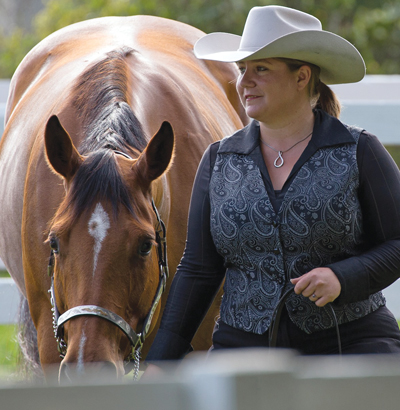
Trainer Clarissa Cupolo suggests that riders stay focused on the goals they want to achieve with their horse in order to make the best use of limited time. Courtesy Clarissa Cupolo
“Whatever you do, remember your time is limited and therefore valuable, so make sure your goals are clear and that you are working toward achieving them,” says trainer Clarissa Cupolo.
Equestrian Goals
At the same time, it’s not just rider-focused goals that after-work equestrians need to consider. The goals working equestrians have for their horses factor into planning, as well.
“For example, maybe you want your horse to be ridden twice a week and you only have time to do it once a week,” says Cupolo. “If you’re at a boarding barn, you [may have access to] a trainer who can work the horse once a week when you can’t.”
Meanwhile, according to Florida horse trainer Christine Massinger, time spent training—either with a professional or as part of a personal program—keeps your horse’s skill set marketable and improves his chances for rehoming in the case of job loss or another change in circumstances that interferes with your ability to care for him.
“You would never not educate your child, would you?” asks Massinger.
Time & Money Management
At the same time, becoming an equestrian juggling life and horses requires making a personal plan that involves everything from understanding the financial commitment that it will require, the time it will demand, and what can be done to smooth out the entire process.
“First, be aware of the numbers, because [a good chunk of] your paycheck is probably going to your horse, and you’ll have to make sacrifices—such as not buying that new car—in order to have him,” says Cupolo. “But if the cost of owning is too high, you can be an after-work equestrian by finding a trainer and taking weekly lessons.”
Be aware that being an afterwork rider borrows time from other things that you might want to do when the workday ends. Sharing personal equestrian goals with a buddy can help.
“It’s hard to be motivated after a long day of work, but if you ride with a buddy, you are more likely to ride rather than give the horse a carrot and a pat on the nose,” says Cupolo. She also recommends making a mental commitment to your hobby by developing a routine around it.
“Plan your day,” says Cupolo. “Pack a change of clothes just as you would when you go to the gym, and brown-bag something to eat so you don’t get hungry and want to rush home to eat,” Family support is also crucial, according to Simone.
“My husband Darrin is totally on board with this, and on Tuesdays and Thursdays when I’m at the barn, he spends time with his friends,” she says. “I don’t have to rush home—I don’t have that pressure.”
Ultimately, becoming an afterwork equestrian is a choice that, despite the demands, offers perks to both horses and riders. According to Massinger, it’s those benefits that make the investments worthwhile.
“Having a horse is hard work—financially and otherwise,” Massinger says. “Ultimately, being an after-work equestrian is not about the quantity of time, it’s about the quality of the time you spend with your horse, and that’s very rewarding.”
Balancing the BudgetAccording to a recent University of Maine study, the average cost of basic horsekeeping is $3,846 per year, with a median price tag of $2,400. Those The cost of keeping a horse at a boarding barn also fluctuates according to location and can range from $100 per month for self-care to between $500 and Basic veterinary costs can range from $30 for twice yearly vaccinations to more Consumables such as fly-spray and bathing products can add a minimum of $100 to the cost of horsekeeping, and horse owners can spend between $35 and $75 per session for riding lessons, and upwards of $1,000 for basic gear including a helmet, boots, saddles, bridles, saddle pads, and other horse related equipment. Whatever the costs, horse owners dedicated to horsekeeping and related sports |
This article on juggling life and horses originally appeared in the September 2019 issue of Horse Illustrated magazine. Click here to subscribe!


